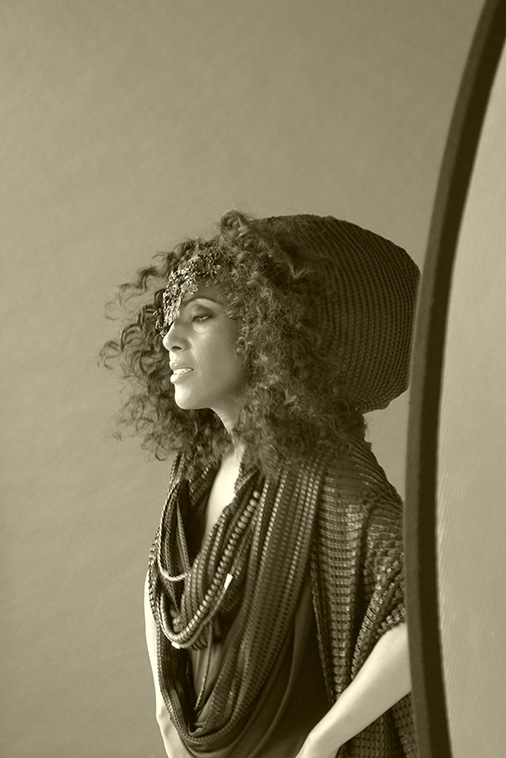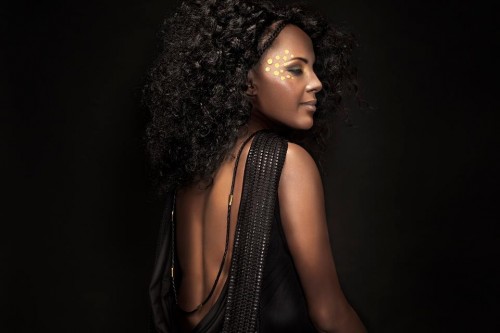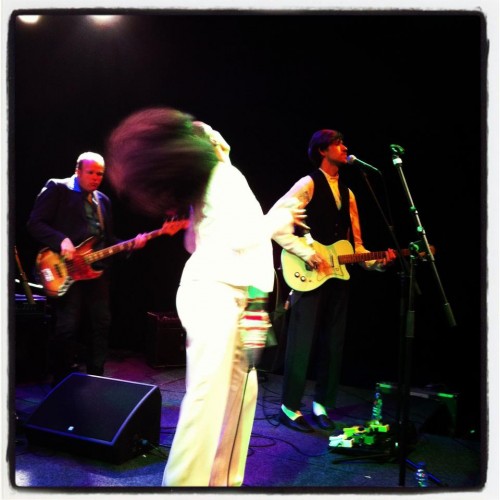Minyeshu is fresh off the release of her stunning new album Black Ink (we reviewed it here), in which she deftly mixes her the traditions of Ethiopian pop with an up to the minute take on funk, soul, and indy rock. We strongly suggest you check it out at her Bandcamp page if you haven’t yet. The talented singer spoke to us from her home in Amsterdam via Skype.
Jesse Brent: I was wondering because I don’t speak Amharic, and I assume that’s the language you’re using for the album...
Minyeshu: Yes. Most of it. Like 99% this time. But like last album, I also used other languages.
JB: So can you tell me a little bit about what your songs are about?
M: Every song tells a different story. Black Ink is a symbol of the beginning of human beings found in Ethiopia: Lucy. We are the black ink going through the river to the mountains, and mixing with the other colors-- yellow, red.
JB: What was the band that you played with on the album? Who were the other musicians?
M: After my last album, playing with my musicians for 12 years, I wanted something more. I wanted next level. So I took a break, looking for new musicians. I found those musicians. I did some projects with them a long time ago. So I spoke with them and it was great to talk to them. They understood me and I started to write some songs.
JB: Are they mostly Dutch or Ethiopian?
M: They’re all Dutch. Except in two songs I use masenqo, the Ethiopian instrument. But the rest is just Western instruments and Dutch musicians.
JB: What brought you to Amsterdam originally? Why did you decide to move there?
M: When I came the first time I was in Belgium for some... reasons. I don’t like to talk about it because I am not a politician and I don’t like to talk about political things. I am an artist. Also, I never write songs about political things. So I came to Belgium after that, and I met my ex-husband. We got my daughter. And then after that I moved to the Netherlands. Also, my management was here in the Netherlands.
JB: And is there a large Ethiopian community there? Are there other musicians from Ethiopia that you know in Amsterdam?
M: Yes. Some of them, but I am not really actively in contact with the Ethiopian community because I want to be international. I want to break through or be an ambassador for the music. And I don’t have time also.
JB: Do you think that you’ll stay in Europe for good? Or would you like to return to Ethiopia at some point?
M: No. I don’t think so. Everybody wants to go back to wherever they come from. I really want to go back someday. I don’t know when. I am already starting to build my contacts in Ethiopia to go there often to play music. I lived there 17 years ago. So it is also different. I’m sure that when my daughter is old enough to take care of herself then I can go there. Maybe I can go there half-half.
JB: I’ve read that you were an actress in Ethiopia. Can you tell me what kind of acting you were doing?
M: I was an actor in a movie, but I came here. It was not easy already, doing my music and singing in Ethiopian language. Already it’s too much work. So I didn’t focus on acting because to be recognized with my music is still not easy. I’m still fighting. I don’t have time to do the other thing because I want to succeed at least with one thing. With music, you need to work 150%, 200%.
JB: You’ve worked with musicians from other countries in Africa. Would you say that that’s influenced your music?
M: A lot. I loved to do that ever since I was young. The first time I saw a lot of that, I did something strange with church music mixing Ethiopian traditional instruments with Western instruments. It was hitting my head and I was like, “This is what I want. I want to be the world and play the strangest instruments from all over the world.” That was already my dream. So when I came here, that’s what I did. I was looking for a different kind of musicians-- not only African musicians, but really different from everywhere.
JB: You’ve played with musicians from Mali and the Congo...
M: Yes. And America, Dutch, and Germany. Also, besides my band, I do other projects-- special projects for musicians from everywhere-- not only Europe, Africa, but everywhere. We share different music, or sometimes strange-- you think it won’t really click, but it does. It really does. Last time I did a project with opera. It was the first time I’d done it, but it was working. It was unbelievable.
JB: You were singing opera?
M: I don’t, but there was an opera singer with my music. We were playing my way. She was singing her way of singing. It was incredible.
JB: So you speak quite a few languages. You speak Dutch, Amharic, English. How many others? French.
M: French a little bit.
JB: How were you able to learn English?
M: In Ethiopia we started English from the first grade: ABCD. In high school we had our integration in English. We never used English outside of school, but it helped when I came here. I started going to school, of course. It feels like my second language. Now I’ve learned Dutch, but English is better. It feels like my first language even now.
JB: Have you come to the United States before?
M: I did when I was 17 for a big tour-- like eight states. But after that, they asked me a couple of times to do festivals, but it didn’t work because some of my musicians didn’t have nationality from here. So they refused to give us work permits, visas.
JB: That’s too bad. I think it would be great if you could perform here.
M: Now I can go anywhere that I want. And I am still in touch with those people. So I will definitely come there and play. And there is a large Ethiopian community and artists there who are my friends. It will be great.
JB: Who are you friends with, in terms of other musicians?
M: There are a lot. Aster Aweke-- she’s living there. All of the musicians actually. More than a hundred or two hundred musicians that have come over there. Just tell me one you know.
JB: Well do you know Teddy Afro?
M: I know him, but he became popular after I left. We spoke one day, one time. That was it.
JB: Also, I know that in Amsterdam, Getatchew Mekurya has collaborated with a group from there as well.
M: Yes. He does projects and tours some cities with The Ex.
JB: So have you met him?
M: Yes. I saw him. But he is an older musician. When I was there I was too young. He was also not really popular when I was there. When he was young I think he was popular. After I left, he became popular. So, I don’t have contact with him. But he is a great saxophone player.











